Einkorn is understandably the hot and trendy ancient-grain flour for sourdough bread baking right now! In this short post I’ll explain why.
Here, I’ll give you instructions for converting an existing starter to einkorn and a recipe for how to create your own einkorn sourdough starter from scratch. You’ll also get links to all the resources you need to keep your new starter healthy, active, and ready for your sourdough projects!
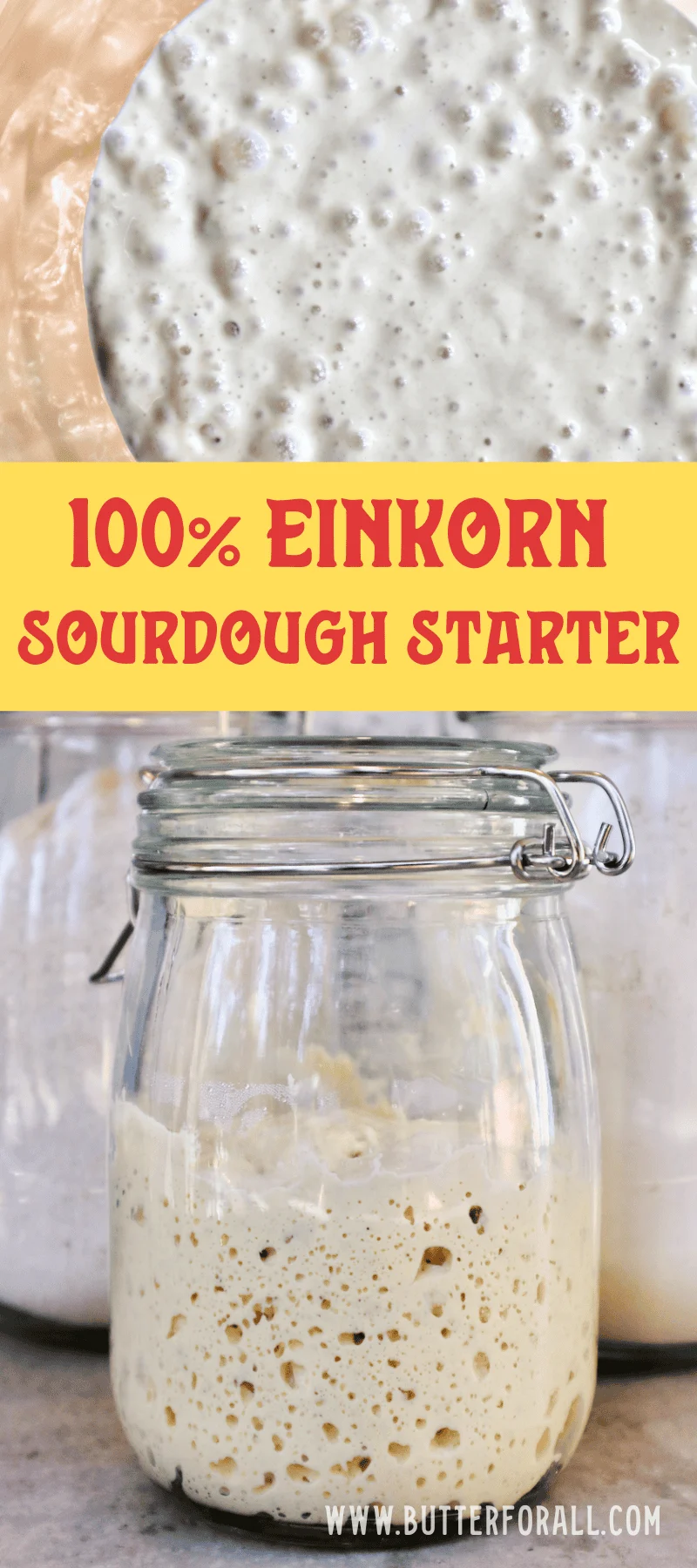
If you already have an einkorn sourdough starter and you want to learn more about baking with 100% einkorn flour, check out my guide: A Guide to Successful Sourdough Baking With Organic Einkorn Wheat
A Quick Summery of the Reasons Why People Are LOVING Einkorn Wheat
- Highest protein grain
- Lowest gluten grain
- Easy to digest
- Nutritious
- Flavorful
- Unique
- Traditional
- Ancient grain
- Non-hybridized
- A healthy challenge to work with.
Read more about einkorn’s amazing qualities here.
Building an Einkorn Sourdough Starter From an Existing Sourdough Starter
The easiest way to start an einkorn sourdough starter is as simple as taking a small portion of your existing sourdough starter and feeding it with einkorn flour.
To do so, take 10 grams of active sourdough starter and feed it with 100 grams of einkorn flour and 75 grams of water.
This will give you enough starter to make your first loaf of almost 100% einkorn bread immediately. See the bottom of the post for a recipe.
After several feedings, the remaining flour from your original starter will be negligible.
You will want to keep your new einkorn starter at 75% hydration for best results.
Keep your einkorn starter separate from your original starter, and only feed it einkorn flour from now on.
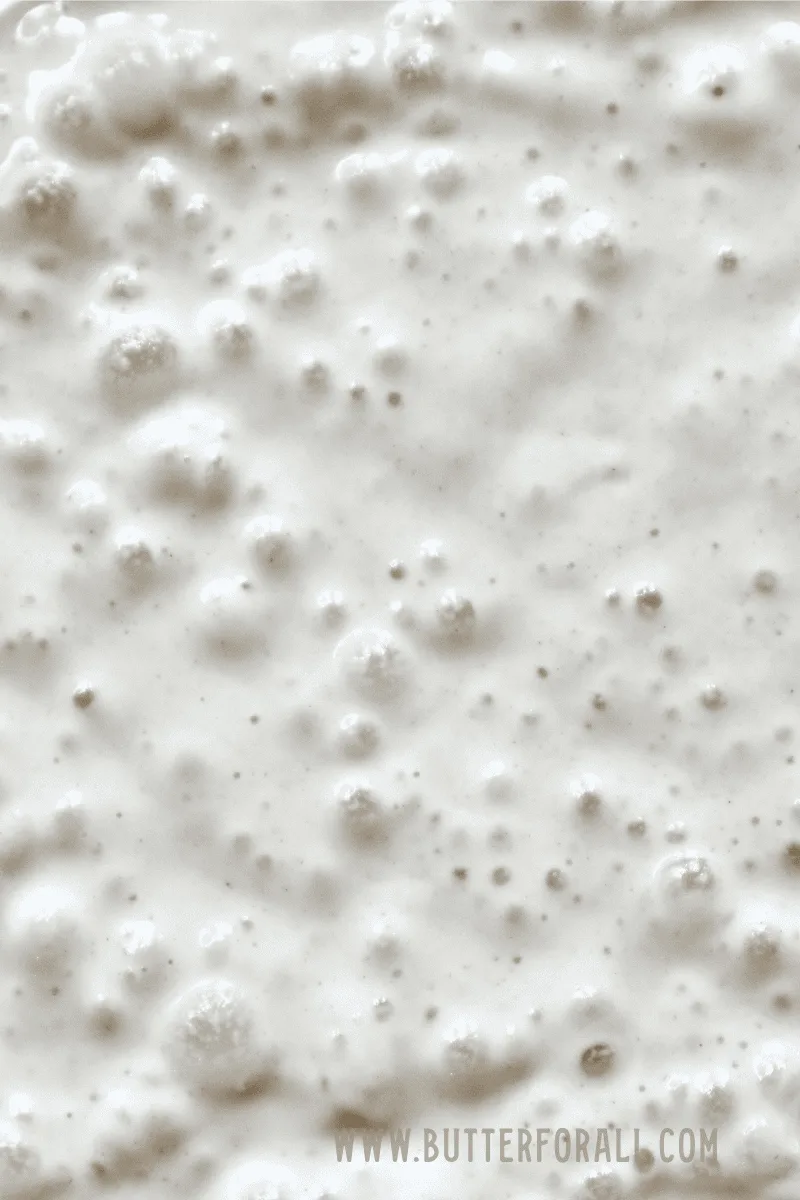
Starting an Einkorn Sourdough Starter From Scratch
In the same way that you would build any from-scratch sourdough starter, start with flour, water, and wild yeast. Wild yeast will come directly from the flour itself (preferably organic whole grain), from adding a piece of yeast-covered fruit (like blueberry, plum, or grape), or from your environment.
Starting a sourdough starter from scratch is, at least, a two-week commitment. You may start to see activity within your starter and you may even be able to use it prior to the two-week mark, but always be realistic about how long it will take to develop a truly balanced and functional starter.
There are some key differences when using einkorn flour to start a starter.
- Organic einkorn flour is four times more expensive than regular organic all-purpose flour. For this reason I would advise you to keep a much smaller starter during the initial development.
- Einkorn flour ferments better at a lower hydration. Keeping a thicker starter at 75% hydration will benefit the starter’s growth, activity, and balance.
- Einkorn flour ferments more quickly than white flour. This is especially true with whole wheat einkorn flour, so you will need to feed your starter more often.
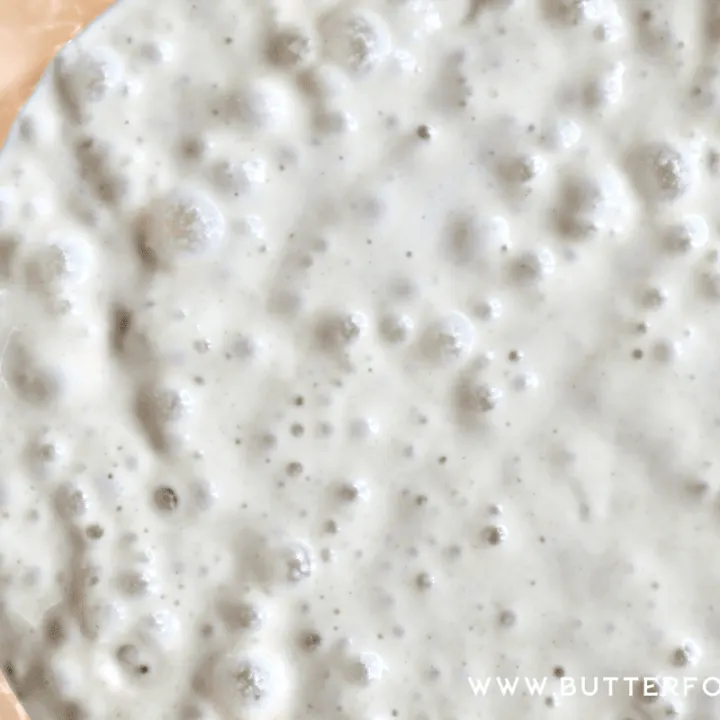
Einkorn Sourdough Starter
Easy instructions for cultivating your own wild yeast and bacteria strains to make a 75% hydration einkorn sourdough starter. This process takes at least 14 days to complete so plan accordingly. You will end up with a 100% einkorn sourdough starter that can be used for baking breads, cakes, tortillas, and more!
Ingredients
- 445 g organic einkorn flour, divided over 14 days
- 369 ml water, divided over 14 days
Instructions
Day 1
Mix 25 g of einkorn flour (2 tablespoons, packed and smoothed) and 19 ml (1 tablespoon + 1/2 teaspoon) of water into a paste. Store it in a small clean jar with a loose-fitting lid (not cheesecloth or other fabric covering). Keep your jar in a warm, draft-free place. This is the beginning of your starter!
If you'd like to add a small piece of yeast-covered fruit to boost your starter, add it during the first mixing and remove it before the first feeding on day two.
Days 2 to 7, feed your starter twice a day. Every 12 hours!
- Every morning and evening remove 22 g of starter (half) from the jar and replace it with 12 g (1 tablespoon) of flour and 10 ml (1 1/2 teaspoons) of water. Stir your starter well and store it in a warm place.
- By day seven you should be seeing some signs of activity. The starter should be bubbling a little and smell fermented (slightly sweet, sour, or alcoholic). You may even see it rise after feeding.
- If there is mold, off-color, or a bad smell do not continue the feedings and please see my troubleshooting guide.
Days 8 to 14, feed your starter three times a day. Every eight hours!
- Every eight or so hours remove 22 g of starter (half) from the jar and replace it with 12 g (1 tablespoon) of flour and 10 ml (1 1/2 teaspoons) of water. Stir your starter well and store it in a warm place.
- During this critical feeding period you should start to see a lot of bubbling activity. Your starter will be ready when it rises to double the volume between feedings.
Day 15 and beyond.
Continue to feed your starter until it is responding accordingly. Once your starter is active, well-balanced, and is being used regularly, feel free to store it in the refrigerator between uses.
You can find more information about storing and using your sourdough starter in my Einkorn baking guide.
Notes
- Some people have found that their starter is ready to bake with by Day 7. I add an extra seven days of triple feedings to insure that the starter is powerful, active, and ready for all the baking projects!
- Keep in mind, sourdough is as unique as you are. Results may vary!
- To build your starter up prior to baking just add a larger amount of flour and water to the last feeding.
- All cups and spoons measurements are approximate, please weigh your ingredients for accuracy!
Recommended Products
As an Amazon Associate and member of other affiliate programs, I earn from qualifying purchases.
-
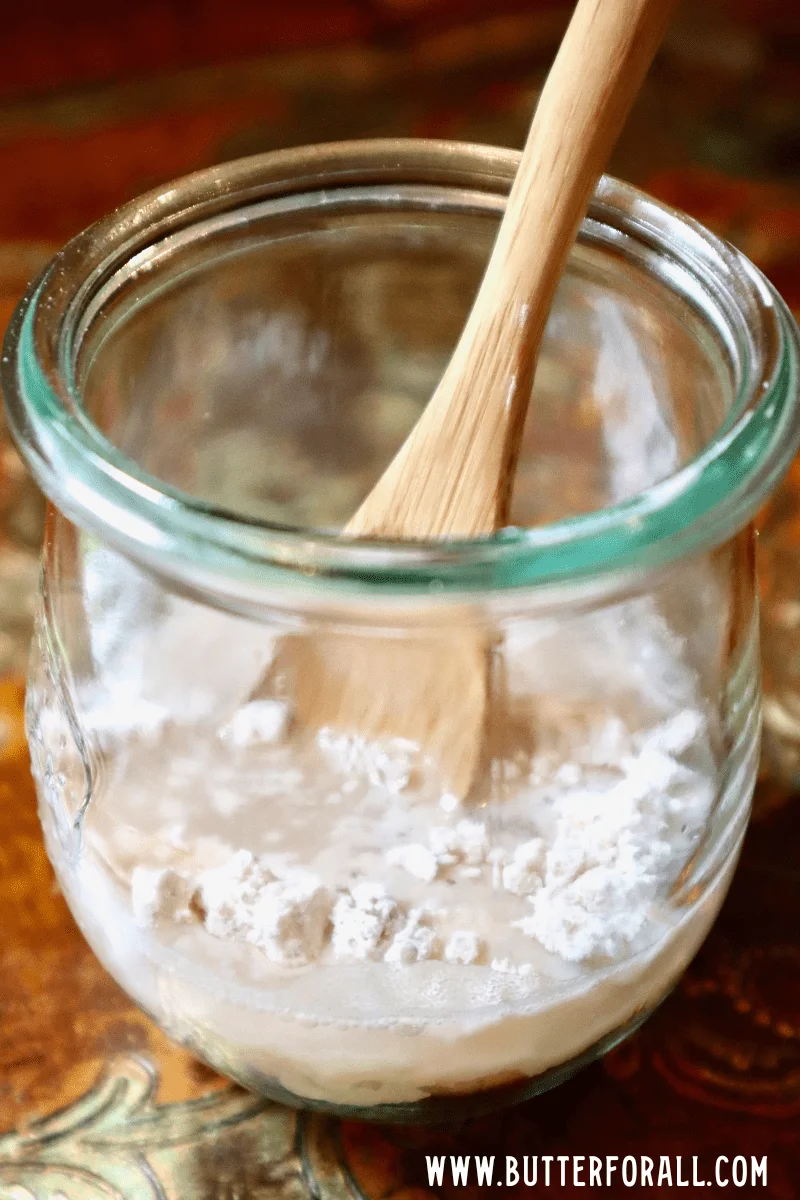 Mini Glass Jars for Dessert and Jelly - Weck Tulip Jars
Mini Glass Jars for Dessert and Jelly - Weck Tulip Jars -
 Jovial 100% Organic Einkorn All-Purpose Flour, 10 Pounds
Jovial 100% Organic Einkorn All-Purpose Flour, 10 Pounds -
 Jovial Einkorn 100% Organic Einkorn Whole Wheat Flour - Baking Flour,
Jovial Einkorn 100% Organic Einkorn Whole Wheat Flour - Baking Flour, -
 Grand Teton - 100% Organic Einkorn Berries, FOR GRINDING AT HOME
Grand Teton - 100% Organic Einkorn Berries, FOR GRINDING AT HOME -
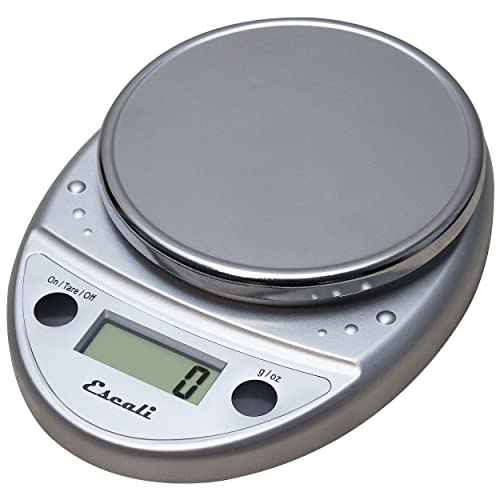 Escali Primo P115C Precision Kitchen Food Scale for Baking and Cooking
Escali Primo P115C Precision Kitchen Food Scale for Baking and Cooking -
 Checkered Chef Stainless Steel Baking Sheet With Rack - Heavy Duty Half Sheet Pan for Baking with Oven Safe Baking/Cooling Rack
Checkered Chef Stainless Steel Baking Sheet With Rack - Heavy Duty Half Sheet Pan for Baking with Oven Safe Baking/Cooling Rack -
 Parchment Baking Paper
Parchment Baking Paper -
 Stoneware Loaf Baking Dish
Stoneware Loaf Baking Dish -
 9 Inch Bread Banneton Proofing Basket - Baking Bowl
9 Inch Bread Banneton Proofing Basket - Baking Bowl -
 Oval (13,8 x 6,1 x 2.7 Inch) Bread Banneton Proofing Basket
Oval (13,8 x 6,1 x 2.7 Inch) Bread Banneton Proofing Basket -
 Camp Chef Home Seasoned Cast Iron Bread Pan
Camp Chef Home Seasoned Cast Iron Bread Pan -
 Tovolo Stainless Steel Dough Whisk, 12 Inch
Tovolo Stainless Steel Dough Whisk, 12 Inch -
 Danish Dough Whisk and Bread Lame Set Double Eye
Danish Dough Whisk and Bread Lame Set Double Eye -
 Pyrex 8-piece 100 Years Glass Mixing Bowl Set (Limited Edition)
Pyrex 8-piece 100 Years Glass Mixing Bowl Set (Limited Edition)
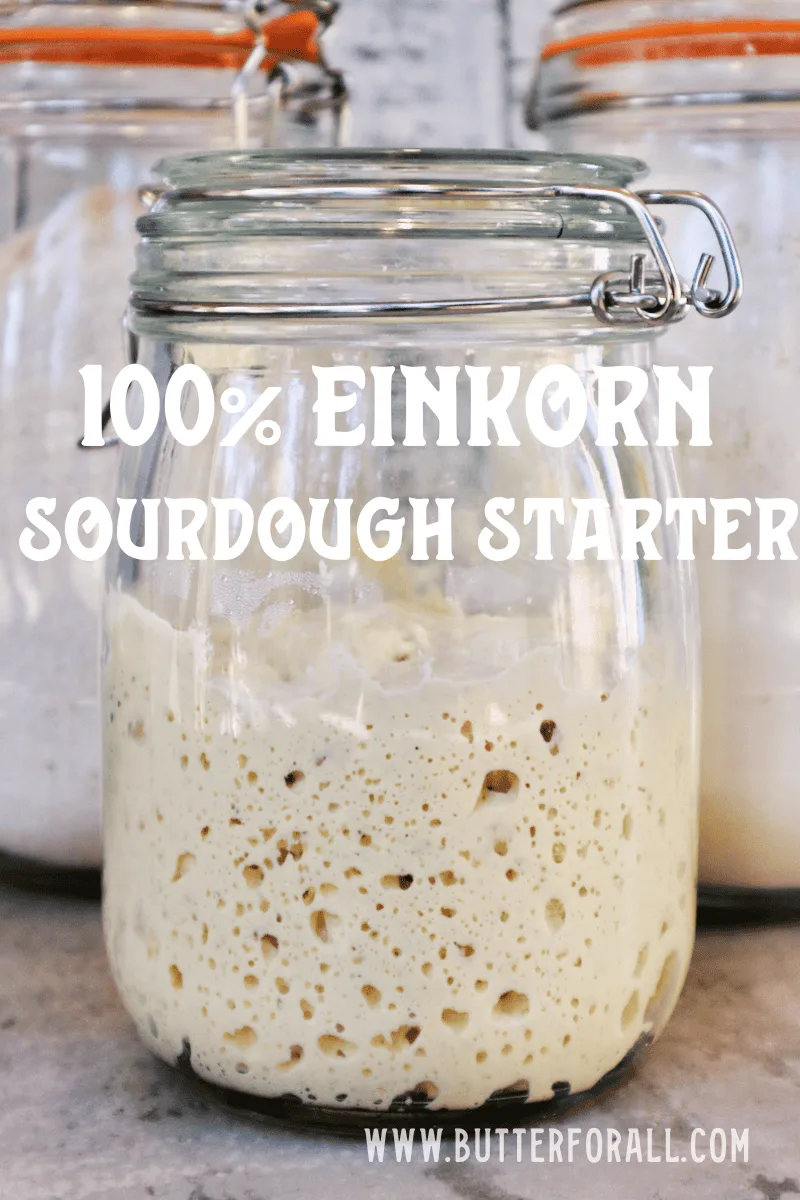
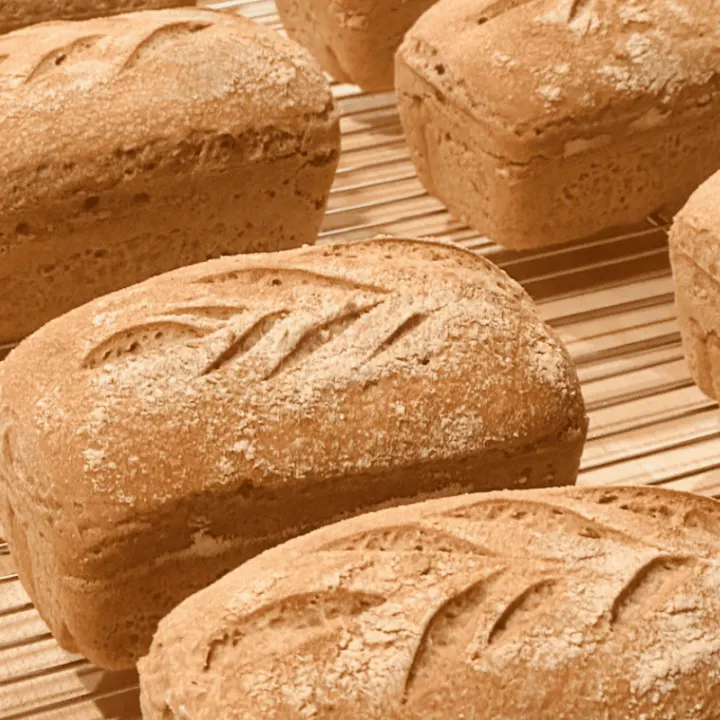
Butter For All's Sourdough Master Recipe -- Adapted for Einkorn Flour
Memorize this simple formula and you'll always have a sourdough recipe on hand that can make great bread, pizza, pitas, hamburger buns, cinnamon rolls, and more.
Ingredients
- 455 grams (3 1/4 cups) organic all-purpose einkorn flour
- 222 grams (just shy 1 cup) water
- 125 grams (1/2 cup) active einkorn starter
- 12 grams (2 teaspoons) salt
Instructions
- In a large bowl use a dough whisk or rubber spatula to stir all ingredients together to form a shaggy dough.
- With wet hands gently fold and rest the dough in 1-minute intervals until it's smooth.
- Shape the dough into a ball. Place it in a covered bowl to ferment.
- Let the dough rest for 4-6 hours in cool room temperature (68°F)
- On a wet or floured surface deflate, portion, and shape the dough as desired.
- Cover the dough and let it proof at room temperature for another 1-3 hours.
- Depending on your size and shape of dough, bake when the dough has just doubled. Overproofing is easy to do with einkorn.
- Bake loaves at 400℉ for 30 minutes or to an internal temperature of 200℉. Pizza and other styles and shapes will require specific baking times and temperatures.
- Cool loaves completely before slicing.
Notes
- For beginners, baking small supported loaves is recommended.
- For sourdough masters, boules can be made with a very gentle touch.
- Whole wheat einkorn flour may be used, but will require less fermentation time overall.
Recommended Products
As an Amazon Associate and member of other affiliate programs, I earn from qualifying purchases.
-
 Messermeister Silicone Bowl Scraper Set - Frosts, Portions, Lifts & Transfers - Easy to Clean & Flexible Precision Edge
Messermeister Silicone Bowl Scraper Set - Frosts, Portions, Lifts & Transfers - Easy to Clean & Flexible Precision Edge -
 Baking, Cooking, & Mixing - 600°F Heat-Resistant & BPA Free Silicone Scraper Spatulas Dishwasher Safe
Baking, Cooking, & Mixing - 600°F Heat-Resistant & BPA Free Silicone Scraper Spatulas Dishwasher Safe -
 Pro Dough Pastry Scraper/Cutter/Chopper Stainless Steel
Pro Dough Pastry Scraper/Cutter/Chopper Stainless Steel -
 Fiddle and Fern Rectangle Collection Mini Loaf Pans, Set of 4, 6-inch Length
Fiddle and Fern Rectangle Collection Mini Loaf Pans, Set of 4, 6-inch Length -
 Le Creuset Stoneware Heritage Loaf Pan, 9" x 5" x 3"
Le Creuset Stoneware Heritage Loaf Pan, 9" x 5" x 3" -
 Pyrex 8-piece 100 Years Glass Mixing Bowl Set (Limited Edition)
Pyrex 8-piece 100 Years Glass Mixing Bowl Set (Limited Edition) -
 Victoria Cast Iron Pizza Crepe Pan, Dosa, Roti Tawa, Budare, 15 Inch, Black
Victoria Cast Iron Pizza Crepe Pan, Dosa, Roti Tawa, Budare, 15 Inch, Black -
 Wooden Pizza Peel, 16" L x 14"
Wooden Pizza Peel, 16" L x 14" -
 Lodge 5 Quart Cast Iron Dutch Oven. Pre-Seasoned Pot with Lid and Dual Loop Handle
Lodge 5 Quart Cast Iron Dutch Oven. Pre-Seasoned Pot with Lid and Dual Loop Handle -
 Danish Dough Whisk and Bread Lame Set Double Eye
Danish Dough Whisk and Bread Lame Set Double Eye -
 Escali Primo P115C Precision Kitchen Food Scale for Baking and Cooking
Escali Primo P115C Precision Kitchen Food Scale for Baking and Cooking -
 9 Inch Bread Banneton Proofing Basket - Baking Bowl
9 Inch Bread Banneton Proofing Basket - Baking Bowl

Liz
Sunday 16th of February 2025
Hi, thank you for this introduction. I have a regular starter all bubbly and ready to go, can I just use that in place of the einkorn starter in this recipe? Also, I didn’t see if you were supposed to bake it with a lid on or lid off for 30 minutes. Typically I bake my sourdough 20 minutes with a lid on and 20 with it off. Also, I am at 6200 feet altitude if that matters. Thanks for your help!
Butter For All
Friday 21st of March 2025
Hi Liz,
You can use a regular starter with einkorn flour, that is absolutely no problem. This recipe makes an open sandwich loaf, typically sandwich loaves aren't covered. If you'd like to bake it in a dutch oven in the shape of a boule you could certainly do that by baking it covered for 20 to 25 minutes and uncovered from 10 to 15 minutes.
Ray
Sunday 15th of December 2024
Hi. I’m wondering if you can help, what does it mean to ferment a flour ?